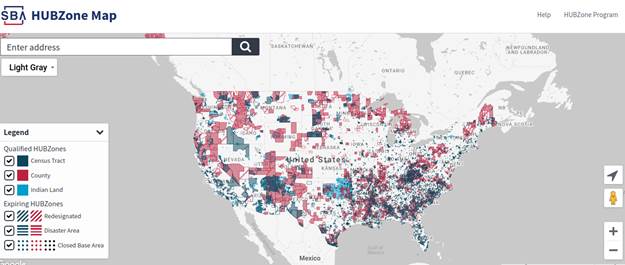 Chris Crum writes for Small Business Resources about what's new for small business. Chris was a featured writer with the iEntry Network of B2B Publications where hundreds of publications linked to his articles including the Wall Street Journal, USA Today, LA Times and the New York Times. Chris Crum writes for Small Business Resources about what's new for small business. Chris was a featured writer with the iEntry Network of B2B Publications where hundreds of publications linked to his articles including the Wall Street Journal, USA Today, LA Times and the New York Times.
|
SBA Expands HUBZone Opportunities to Small Businesses
Image via SBA.gov The United States Small Business Administration (SBA) recently issued a final rule to implement changes to its Historically Underutilized Business Zone (HUBZone) program. The changes are designed to attract small businesses and encourage them to invest in these economically distressed communities that make up the HUBZones. This includes hiring residents from within the HUBZones. According to the SBA, the rule changes will also make it easier for federal contracting officers to identify and work with small businesses that are HUBZone-certified. There are numerous HUBZones located throughout the country. The SBA has an interactive map on its website that shows exactly where they all are.
HUBZone Map (via SBA.gov) One new change is that an employee who resided in a HUBZone for a minimum of six months at the time of certification or recertification, and is still in one for at least six months, may continue to be considered a HUBZone resident if they are still employed by the same business, even if he/she moves to a non-HUBZone area. This is also the case if the area loses HUBZone eligibility. Another change is that maps will be updated every five years rather than each year. They will utilize data from the Census Bureau, the Department of Housing and Urban Development, and the Department of Labor. Additionally, small businesses that invest in HUBZones by buying a building or entering into a long-term lease can maintain HUBZone certification for a period of 10 years, even if the location loses HUBZone status, provided the business meets HUBZone program requirements. Other changes are related to contracting provisions. For example, if a business is certified at the time of its initial offer for a contract, it will be considered a HUBZone small business throughout the life of that contract. If a business is certified at the time of an initial offer for a HUBZone Multiple Award Contract, it will be considered certified for each order issued against the contract. Acting SBA Administrator Chris Pilkerton commented, “The exciting improvements outlined in this rule were designed to address longstanding uncertainty from both small businesses contemplating an investment in a designated HUBZone, as well as government agencies which seek to use HUBZone companies. We anticipate that these impactful changes will lead to the increased use of HUBZone certified small businesses across the country. Further, additional program enhancements which will expand the HUBZone footprint and provide greater support to HUBZone eligible small businesses will allow contracting officers to better identify more HUBZone firms and get federal contracts into the hands of those businesses.”
Chris Pilkerton, Acting SBA Administrator (via SBA.gov) The HUBZone changes are effective as of December 26, 2019. Additional changes will go into effect in January 2020. These include permission for governors to petition the SBA every year to designate rural areas, with populations under 50,000 and unemployment levels of 120% of the US or state average, as HUBZones and the expansion of the “Early Engagement Initiative,” which aims to increase the procurement readiness of businesses applying for certification. Read other business articles |


